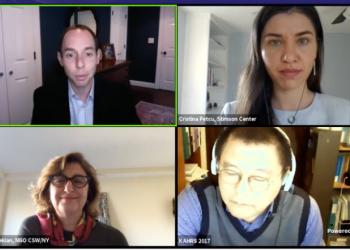Panel Explores Strengthening Coherence Between the UN and the G20
How can legitimacy be strengthened and sound policy be articulated at the international level? What functions are particular to the universal membership of the United Nations, and what roles might narrower, ad-hoc arrangements play?
These questions were central to a panel discussion the Baha’i International Community moderated as part of the C20 Summit, a global gathering hosted this year under the presidency of Saudi Arabia. The C20 provides a platform for civil society organizations to engage with the G20, a group of representatives of twenty of the world’s largest economies.
Entitled “Multilateralism in a Time of Transition: The Future of the G20 and the UN,” the event explored shifts in political alignment seen as a result of the COVID-19 pandemic, and challenges and opportunities for global governance going forward.
“Throughout history, periods of turbulence have presented opportunities to redefine collective values
and the assumptions that underlie them,” said Baha’i International Community representative Daniel Perell, who moderated the event.
“So, too, does the present moment. The range of areas in which established systems and approaches are in need of radical transformation suggests how critical the coming months and years will be in determining the fortunes of humanity.”
Mr. Perell served on the International Advisory Committee for the C20 and appeared in a short video of leadership team members offering thoughts to G20 leaders.
The role of trust in reinvigorating the multilateral system was among the concepts highlighted by panelists. Harsh Jaitli, CEO of Voluntary Action Network India, noted the relatively high degree of trust people around the world have in the UN, because of its universal membership and world-embracing mandate. “It is necessary that we all play a role in strengthening that trust,” he said.
Cristina Petcu, a research associate at the Stimson Center, spoke to the role that higher income countries can play in leading by example, through making changes to their own behavior. In areas such as adopting more sustainable patterns of production and consumption, she noted the importance of educating children and youth.
The role of values was another point of emphasis. “What is effective in creating change?” asked Houry Geudelekian, Chair of the NGO Committee on the Status of Women, New York. In reaching out to Member State representatives at the UN, she said one message is critical: “Your morality matters. Your values matter.”
In closing remarks, Mr. Perell echoed the session’s focus on bringing the voices of the people of the world into systems of global governance. “We are in a privileged moment in history, where we can set the precedents for universal participation in ways never before dreamed of.”
A link to the event can be found here. For more on the Baha’i International Community’s perspective on global governance, please see its recent statement entitled A Governance Befitting: Humanity and the Path Toward a Just Global Order, available here.
